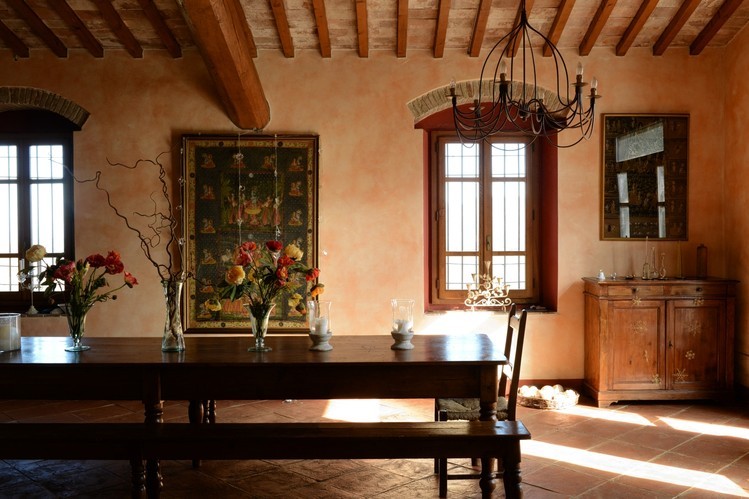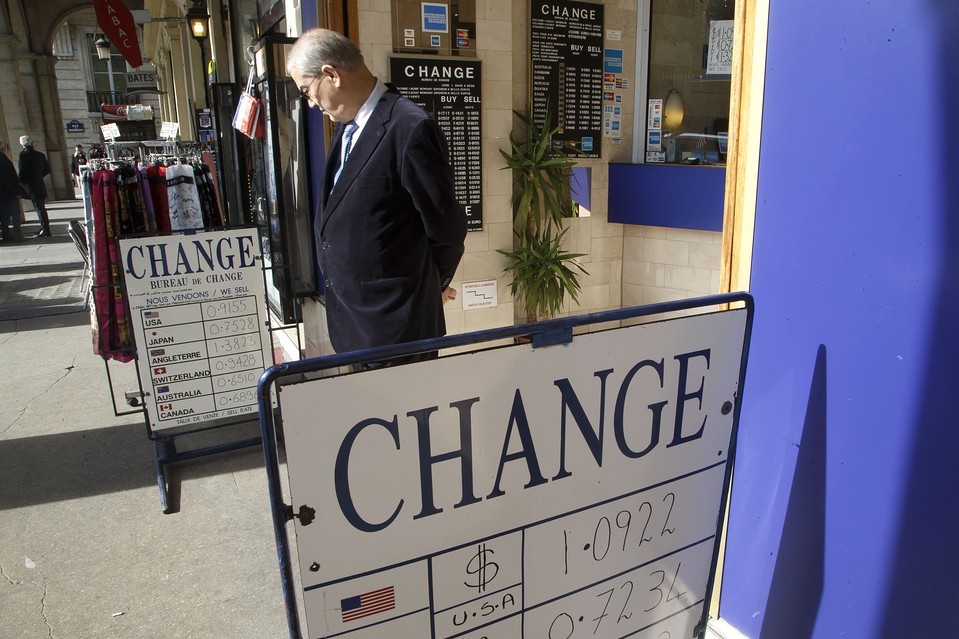American Real Estate Buyers Take Advantage of the Falling Euro
Post on: 2 Июль, 2015 No Comment

U.S. buyers dreaming of a Tuscan villa or a Parisian pied-à-terre are enjoying discounts created by the strong dollar
ENLARGE
Lane Auten and his wife Nieves Prieto at their Barcelona home. Photo: Sergio Pirrone for The Wall Street Journal
Last fall, when she agreed to pay €690,000 for a 366-square-foot one bedroom in the 7th arrondissement, the cost in dollars was roughly $870,000. Today, it is about $760,000, though Ms. Suydam already put down a 10% deposit and exchanged some euros at a slightly higher rate. She plans to close later this month.
For Americans who have long dreamed of owning a European getaway, the euro’s tumble is a game changer. From its low point last year to today, the dollar has strengthened by 26% against the euro. The last time the dollar traded this high against the euro was in 2003.
“The consensus is that the euro-dollar will be at 1.10 by the end of this year, but a number believe the dollar could be even stronger,” said Daragh Maher, FX strategist at HSBC in London. As of publication, one euro traded for $1.10.
Agents in Paris, Tuscany and Barcelona said that since January they’ve been flooded with calls and emails from Americans. Sotheby’s International Realty in France and Monaco currently has 30% to 35% more American clients than in 2012 and 2013, said chief executive Alexander Kraft. He added that between price declines and the slide of the euro, Americans could now pay 40% less in Paris than they would have in 2012.
Here’s a look at how the exchange rate is affecting Americans in three popular second-home locations.
ENLARGE
Two years ago, the couple rented a two-bedroom apartment for €2,000 a month, or roughly $2,650 at the exchange rate at the time. Today, they’re paying about $2,200 a month. Photo: Sergio Pirrone for The Wall Street Journal
BARCELONA
Lane Auten has an eye for a bargain. From 2010 to 2012, he managed a real-estate portfolio in the San Francisco Bay Area. Three years ago, believing that “the yield is no longer attractive” in U.S. single-family houses, he moved to Barcelona with his Spanish wife Nieves Prieto, a documentary filmmaker. He created a new investment group that buys, renovates and sells luxury apartments in the city.
Seven months ago, he and three other investors found a historic building in the city’s Gothic neighborhood. His personal stake: €1.2 million, or roughly $1.62 million at the exchange rate last summer; when he closed in February, he paid around $1.35 million.
“It was a good deal when we first came across it, and it’s been getting better ever since,” said Mr. Auten, 47.
The soft euro has also been a boon for Mr. Auten’s personal home. Two years ago, he and Ms. Prieto, 42, rented a two-bedroom apartment in the city’s trendy Gracia neighborhood for €2,000 a month, or roughly $2,650 at the exchange rate at the time. Today, they’re paying about $2,200 a month. With costs down, they decided to get some additional space for guests and in January leased a studio apartment with a large terrace upstairs for €1,000 a month, or $1,100.
Alex Vaughan, founding partner of Lucas Fox, a luxury realty in Spain and Portugal, said Americans have traditionally made up just 1% to 2% of his client base. Last year, that figure grew to 5% and continues to increase.
Last fall, Engel & Völkers, a Hamburg-based international luxury realty, opened an office in Madrid that it plans to staff with more than 200 multilingual sales people; the company opened an equally large office in Barcelona two years ago. The goal is to make house-hunting more similar to the process in the U.S. said managing partner Philipp Niemann.
“We are prepared for dollar buyers,” Mr. Niemann added.
ENLARGE
Lisa Suydam in the apartment she just bought in Paris. Photo: Antoine Doyen for The Wall Street Journal
Amanda and Michael Drinnan, who live in the San Francisco Bay Area, have long had a pied-à-terre in Paris, but last fall, they decided to hunt for a larger apartment in a more central area. They found a high-ceilinged one bedroom in the trendy Marais neighborhood for €785,000—about $980,000 at the time—and went into contract in November. They’re planning on closing at the beginning of April; at today’s exchange rate, they’ll pay about $864,000.
That math explains why “our inbox is exploding with prospective requests,” said Miranda Bothe, founder of Paris Property Group, a real-estate agency that serves foreign house-hunters, including the Drinnans and Ms. Suydam.
“The media is saying it is going to be one to one,” said Ms. Bothe, referring to a parity exchange rate. “So people understand that if they look now, they might close at just the right moment.” Typical closings take two to three months in Paris, Ms. Bothe said.
At the highest end of the market, Americans already came back last year, after becoming scarce after 2008, said Charles Marie Jottras, chairman of Daniel-Feau/Christie’s International Real Estate. Americans represented 19% of the company’s foreign buyers in France last year, up from 14% in 2010, said Mr. Jottras.

The increase in American buyers of Paris luxury property—above the €2 million mark—is partly due to the fact that this segment is selling for 15% less in euro terms than in 2012, Mr. Marie said. Combined with the new exchange rate, that means Americans get a steep discount, he said. There are also more choices: Inventory of the highest-end apartments is way up, said Mr. Kraft of Sotheby’s, partly in response to new taxes on wealth and assets.
In early February, Susie Hollands, a real-estate agent at Vingt Paris, drove around Paris showing a potential client properties. Between apartments, he checked in with his financial adviser on his cellphone about the latest European Central Bank decision and how it might impact the exchange rate, she said.
ENLARGE
The dining room of Jerry Stafford’s home in Italy. Photo: Stefano Scatà for The Wall Street Journal
Real-estate agents in Tuscany report increased inquiries from Americans since January, but say some clients express misgivings. Mike Braunholtz, sales director of Prestige Property Group, a European real-estate marketer based in Dorset, U.K. said some clients worry that if Greece abandons the euro, the currency could plummet, damaging the value of European properties in the long term. Others fear buying too soon and missing out on discounts if the euro sinks still lower.
John Jonk, sales manager at Tuscany Sotheby’s International Realty in Italy said that some Americans are finding ways to hedge their bets. “Early fall last year I sold a beautiful home to a client in New York. He expected the dollar to come to parity so he did some hedging,” by financing the purchase partially in cash and partially with a euro-dominated mortgage, Mr. Jonk said. In this way, he locked in the exchange rate at the time with his cash portion. If the euro sinks further in the future, he plans to pay off the loan balance.
The strong dollar can work against Americans who want to sell their European properties, if they must exchange their euros back into dollars. Jerry Stafford, 71, bought an “old barn” in Tuscany in 1995, with his Italian wife, Anna Duzzi, 64, a retired fashion executive. They spent years renovating it into a 5,500-square-foot, stone-walled estate. They put it on the market in 2011 at €3.5 million—approximately $4.6 million at the time. Today, it is asking €2.6 million, or roughly $2.9 million.
Mr. Stafford said that people who come to view the house tell him “they are waiting to get the value of their lives if the euro breaks up,” he said.
“We didn’t have the huge price drop that other countries had in 2008,” said Marta Romolini, co-founder of Romolini Immobiliare, an affiliate of Christie’s International Real Estate in Tuscany. Instead, owners held firm on prices, causing inventory to swell. Prices finally begun dropping in the past two years, in some cases up to 50%, Ms. Romolini said.
The new prices, plus the exchange rate, are just now starting to lure Americans back into a market they have avoided since the financial crisis, said Valerie Bottazzi, owner of Tuscany Real Estate.
Uncertainly about the euro has hampered efforts to sell his house, said Mr. Stafford, a market-research executive. Still, he doesn’t remotely regret moving to Tuscany.
“I have the best quality of life anywhere,” he said.
—Tom DeStefano contributed to this article.














